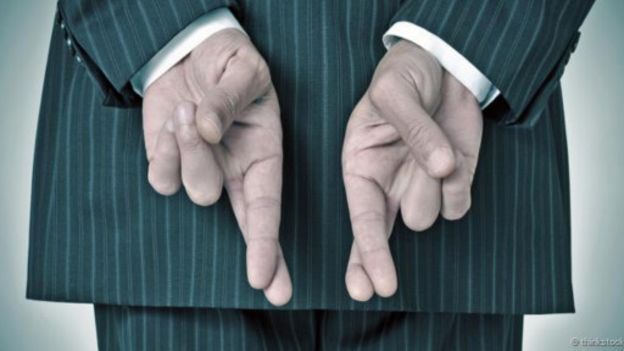赢得他人信任的4种简单方法
BBC露西·马库斯(2023年9月16日)

Science Photo Library
“相信我。”
这句话似乎已经被人用烂了,几乎变得毫无意义。当然,所有人都渴望信任。企业希望得到你的信任。同事也希望得到你的信任,因为只有这样才能帮助他们完成工作。
从很多方面来看,信任是让人们团结在一起的粘合剂,因而可以让人与人之间的交流互动更加顺畅。我们通过eBay买卖东西时,这些交易都是基于对他人的信任。我们使用Uber这样的服务乘坐他人的汽车时,需要给予他人极大的信任。我们向Fitbit或苹果这样的公司提供极其私人的数据时,同样要相信他们会保护我们的数据。我们在办公室里参与团队合作时,也相信同事都会全力以赴地做好工作。
每当与他人互动时,我们几乎都要或多或少地相信与我们打交道的个人或企业是值得信任的。
但信任需要通过努力工作和实际行动才能获得,光靠一味空想是无法实现的。
必须将信誉融入一家公司的血脉。这不能仅仅停留在口头上,还要落实到实际行动中,从董事会到管理层,再到零售店员和工厂工人,甚至包括人们走进公司大门时负责接待的员工。
如何让“相信我”变得言之有物?无论是企业还是个人,都可以遵循相似的原则。
不能光说不做:行动胜于语言。光是嘴上说“相信我”或者精心制作了使命宣言是不够的。大姿态很容易辨认,但真正能在长期产生最大影响的还是细节。当管理层对董事会说:“我们致力于成为优秀的环保公民”时,我希望看到他们落实的项目细节,我还想看到这些行动所产生的结果,以便确定他们不是在做表面文章。

有时候,对别人说“相信我”反而会降低你的可信度。(图片来源:Thinkstock)
以个人为例,按时赴约、严守时间、正面作答——这些看似不起眼的事情汇集起来就能赢得同事和客户的信任。企业同样如此,应当遵守商业承诺、明确商业关系,并通过日常琐事展示组织的信誉。
保持透明:建立信任的最大障碍之一,就是保密或掩饰。毫无疑问,企业的某些内部事项必须保密,但仍然可以通过很多方式明确自己的行为,而不必披露机密信息。
如果你希望人们相信你或你的公司,至少应该愿意与之分享一些促使你制定决策的信息。如果你愿意大方地回答问题,并允许人们展开一定程度的深入探讨,便有助于建立信任。否则,如果你表现出冒犯或防备的态度——“什么?你不信任我?”——那就会令对方感到紧张,导致他们以为你在隐藏什么东西——这种想法有可能是正确的,也有可能是错误的。如果董事会成员提出一些深入的问题,证明他们非常称职。当消费者这么做时,表明他们与你的产品或服务有过互动,并且已经有了一定的了解。
当需要重塑信任时,透明显得尤为重要。
当需要重塑信任时,透明显得尤为重要。例如,银行业最近针对即将开展的改革发表了重大声明,但他们的实际行动却与他们的很多承诺背道而驰。不久前,我们还发现汇丰银行因为被控帮助其客户避税而登上媒体头条。这种行为模式会不断蚕食信誉,久而久之,要重塑信任就会变得更加困难。人们需要看到持续不断的实际行动,还要知道此事的责任人确实受到了处分,而且也的确因此改变了自己的行为。即便如此,仍然需要花费时间,而且要经过通力合作,才能重塑因为过去的鲁莽行为而丧失的信誉。
切莫不择手段:有一段时间,企业领导人认为应该不择手段。只要对股东有利,而且能够创造利润,就不必在乎方式。破坏环境、降低工资、管理不善——任何手段都可以为其所用。
然而,消费者、客户和社区已经不再接受这种方式。如今,想要获得信任,就必须成为优秀的企业公民,而且要恪守承诺,承担社会责任。投资者、消费者、客户和合作伙伴现在都很关注用工不当的问题。苹果与富士康之间的关系广受瞩目便是很好的例子,还有很多企业也因为在欧洲陷入纳税纠纷而备受关注,之前是星巴克,最近有麦当劳。
个人同样如此。怀着敬意对待同事和客户是真正取得成功的唯一方式。即便有些人起初似乎凭借不道德的方式取得了成功,但他们最终还是需要求助于同事,于是他们很快便会发现,根本没有人愿意支持他们。
问责制:这一条很明确。如果你做错了事情,那就要承担责任,无论是企业还是个人都不例外。其实就是这么简单。如果犯错的个人或组织坦白承认错误,并迅速改正错误,人们往往会原谅他们。在整个过程中保持明确和透明便可保持和提升信誉。
使命宣言和意向声明或许可以展示你的计划,但随后必须要辅以切实而透明的行动,才能真正建立信任,既可以与同事发展忠实而紧密的关系,也可以与客户和社区建立持久的关系。
获得和保持信誉需要不断付出努力,但完全值得为此付出。
露西·马库斯(Lucy Marcus)是一名获奖作家,还是多家组织的董事长和非执行董事。她还是Marcus Venture Consulting公司的首席执行官。
Four simple ways to earn the trust of others
By Lucy Marcus
The phrase is used so frequently it has become almost meaningless. Of course, everyone wants trust. Companies want you to trust them. Colleagues want and need your trust to get their work done.
In many ways, trust is the glue that holds us together, in turn making our interactions work more smoothly. We buy and sell things to other people via eBay and the transaction is based on trust. We get into other people's cars with a service like Uber or let strangers stay in our homes with Airbnb, and that requires taking a big leap of faith. We provide very personal data about ourselves to companies like Fitbit or Apple and trust that they will keep the data safe and secure. We work in collaborative teams in our offices and trust that our colleagues will pull their weight and do good work.
Almost every time we interact with one another it comes with a certain amount of belief that the people or businesses we deal with are trustworthy.
But trust is earned through hard work and actions, not simply good intentions.
Demonstrating trustworthiness has to be part of the very DNA of a company. It must be proven not only by word but also by deed, from the boardroom and executive team through to the shop front, the factory floor, and the person who greets staff and clients as they walk through the doors.
How do you make “trust me” meaningful? The principles are similar for businesses and people alike.
Don't just talk about it — do it. Actions speak louder than words. Simply saying "trust me" or having a carefully crafted mission statementisn't sufficient. Big gestures are the easiest to identify, but actually it is the small actions that can have the biggest impact over time. When the executive team says to the board “We are committed to being good environmental citizens” I want to see the details of the programmes they are implementing, and I want to see the results of those actions to know that they are more than lip service.
Individually, showing up on time, meeting deadlines, answering questions directly — these are almost unnoticeable things that add up to building trust with colleagues and clients. The same thing holds true for businesses, which should follow through on business commitments, be clear about business relationships and demonstrate through day-to-day conduct that the organisation is honourable.
Transparency: One of the biggest barriers to building trust is secrecy or dissembling. No doubt, some things must be kept confidential in business but there are ways a company can be clear about its practices without revealing confidential information.
If you want people to trust you or your company, you must be willing to share at least some of the information that feeds into the decisions you are making. The willingness to deal with questions gracefully and to allow people to drill down a bit helps build trust. If instead you react in an offended or defensive manner — "What? You don't trust me?" — it puts people on edge and makes them think, rightly or wrongly, that you are hiding something. Board members who ask probing questions demonstrate good stewardship. When consumers do the same thing, they show that they are engaged with, and educated about, a product or service.
Transparency is particularly important when there is a need to rebuild trust. For example, the banking sector has recently made big statements about impending reform, but their conduct continues to run counter to the many promises that were made. Most recently we’ve seen the bank HSBC hitting the headlines for allegedly aiding its clients to evade paying tax. This pattern of behaviour continues to erode trust, and rebuilding it becomes more difficult over time. People need to see real and consistent action and know that the people who are responsible for maleficence and oversight are actually held to account and that business practices actually change as a result. Even then, it will take time and concerted effort to rebuild the trust lost by reckless action in the past.
The ends don't justify the means. There was a time when businesses leaders thought that the ends justified any means. As long as companies had results for shareholders and the bottom line was right, it didn’t matter how they got there. Environmental damage, low wages, bad governance — anything went.
Consumers, clients and communities are no longer willing to accept that. Building trust now requires companies to be good corporate citizens and to have a real commitment to social responsibility. Investors, consumers, clients and partners care deeply when they think that companies are associated poor labour practices, as can be seen from the attention paid to concerns around Apple’s association with Foxconn or companies who are perceived to not pay their fair share of taxes like the controversy in Europe over Starbucks, and most recently, McDonalds.
The same holds true for individual behaviour. Treating colleagues and clients with respect and regard is the only way to really get ahead. Even those who seem at first to get ahead with unethical behaviour will eventually find they need to call on colleagues and quickly learn there is no group willing to support them.
Accountability: This is fairly straightforward. If you did something wrong, take responsibility, both as an individual and as a business. It really is as simple as that. People will often forgive a mistake if the person or organisation owns up and acts to rectify it quickly. Done with clarity and transparency, that can sustain and enhance trust.
Mission statements and statements of intent may lay out your plans, but only by following through with concrete and transparent actions will trust be built, either in developing loyal and strong relationships with colleagues or long lasting relationships with customers and the community.
Trust must be earned and retaining trust requires constant effort, but it is worth it.